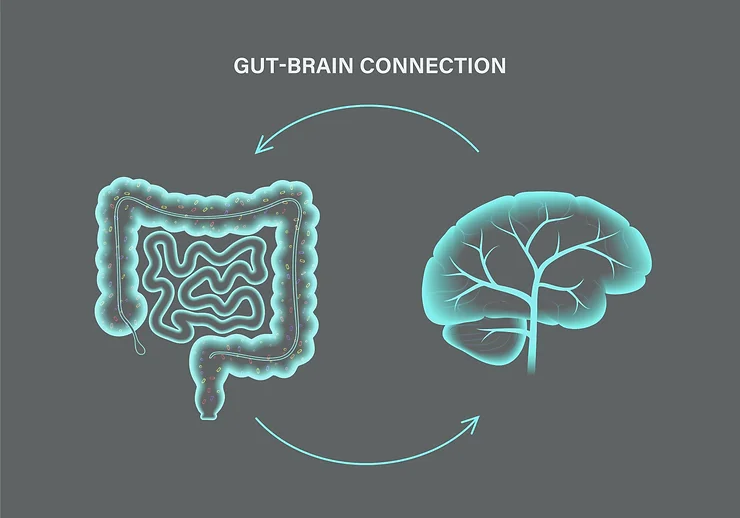The Gut-Heart Connection: How Your Gut Affects Your Heart
February 10, 2023

You may have heard about the gut-brain connection. New research is providing evidence that there is also a gut-heart connection!
There are many factors that affect heart health, such as a person’s weight, activity level, smoking history, food choices, and genetics. An emerging new factor that appears to play a significant role in cardiovascular function is the gut microbiome.
The gut microbiome includes over 100 trillion microorganisms that naturally live in the gut. If these microbes are out of balance (called “dysbiosis”), research indicates that it may have a negative impact on heart health. We know that gut bacteria communicate with other organs in the body, so this association is not entirely a surprise.
The Impact of Imbalanced Gut Microbes
The gut-heart connection is receiving more attention in the scientific community because gut dysbiosis (imbalanced bacteria) has been shown to negatively affect multiple areas of cardiovascular function, such as:
- High blood pressure
- Increased risk of heart attack
- Increased risk of stroke
- Increased risk of atrial fibrillation
- Lower levels of HDL (“good”) cholesterol
So how can microbes in the digestive tract affect the cardiovascular system? Didn’t we learn in biology class that the body has different systems with different jobs? The gut digests food and the heart pumps blood. Yes, but these systems in our body are more interrelated than we once thought!
Unhealthy Microbiome = Inflammation = Heart Disease?
Early research is examining the role of inflammation in the gut-heart link. This is the type of inflammation you can’t see or feel on the outside of your body, but it is occurring internally and may affect other health symptoms (e.g., achy joints, brain fog, skin problems, etc.).
When there are too many unhealthy bacteria and/or not enough healthy bacteria in the gut, inflammatory compounds may be produced. The reason for the question mark in the headline is that the literature shows an association, but more research is needed to define the mechanism of exactly how dysbiosis (imbalanced microbiome) affects our heart.
Many studies have focused on an inflammatory marker called TMAO (trimethylamine N-oxide) which is produced when there is an abundance of unhealthy bacteria in the gut. In a scientific review of 19 studies published in the Journal of the American Heart Association, researchers found that a high TMAO level was linked to a 62 percent higher risk of major cardiovascular events such as heart attack or stroke.
A similar review of 17 studies published in the European Heart Journal showed that high levels of TMAO were associated with a 67 percent higher risk of major cardiovascular events such as heart attack or stroke. These results were independent of other risk factors such as high cholesterol, high triglycerides or high blood pressure.
Although research on the microbiome as it relates to heart health is relatively new, there is enough research to warrant a connection between an unhealthy microbiome and risk for heart disease.
Leaky Gut and Heart Disease
Another potential risk factor for heart disease may be leaky gut, or increased intestinal permeability. Leaky gut is caused by an unhealthy microbiome and a variety of lifestyle factors, such as poor diet, stress, medications, toxin exposure, and others. These factors cause a gradual degrading of the gut lining which results in gaps between cell junctions, also known as “increased intestinal permeability” (kind of like small holes in your window screen).
The combination of dysbiosis and leaky gut leads to increased inflammation throughout the body. Unhealthy bacteria produce inflammatory compounds called LPS (lipopolysaccharides) which can leak out of the digestive tract into the blood stream and travel anywhere in the body. Recent research indicates that a higher LPS level in the blood stream is linked to higher risk for heart problems, such as atherosclerosis.
The problem is that many people who have gut dysbiosis or leaky gut syndrome may not be aware they have it because it shows up as symptoms they ignore. These symptoms may include mild GI discomfort such as bloating, gas, constipation, or occasional diarrhea. Symptoms of dysbiosis or leaky gut may also show up as non-GI symptoms such as brain fog, low energy, achy joints, skin conditions, or mood swings.
Tips to Promote Heart Health (and Gut Health)
- Eat a Mediterranean-style diet that is rich in:
- Vegetables
- Fruit
- Whole grains (gluten-free if you’re sensitive)
- Legumes
- Nuts
- Fish (wild, not farmed) and white meat poultry (organic if possible)
- Olive oil
- Moderate amounts of fermented dairy foods (yogurt, cheese) (dairy-free if you’re sensitive)
- Limit or avoid red meat
- Include gut-friendly probiotics (healthy bacteria) and prebiotics (food to help gut microbes flourish):
- yogurt or kefir
- fermented foods (e.g., kimchi, sauerkraut, and miso)
- fruits and vegetables (e.g., berries, oranges, broccoli, carrots, and zucchini)
- nuts and seeds (e.g., walnuts, cashews, and chia seeds)
- whole grains (e.g., oats, quinoa, etc.)
- If you exclude certain food groups, take a high quality multivitamin/multimineral to prevent nutrient deficiency
- If you don’t eat fish at least twice weekly, take a high quality omega-3 fatty acid supplement
- Drink at least 8-10 cups of water daily
- Incorporate stress management techniques into your daily routine
- Be physically active on most days of the week (walk, jog, bike ride, yoga, lift weights, etc.)
- Get outdoors daily
The Bottom Line
If you think you have heart or digestive health problems, talk to your physician for proper diagnosis and treatment. In addition to seeking proper healthcare advice, consider choosing healthier foods as described above to promote a balanced microbiome and improved cardiovascular health. Following a Mediterranean-style diet as well as incorporating foods that support gut health may not only reduce minor digestive symptoms like gas and bloating, but may also protect the heart long term.
If you need help with incorporating diet and lifestyle strategies to support the gut microbiome, consult a Registered Dietitian Nutritionist who is familiar with this area of research. You may also book an Introductory Call with Kirkman Nutrition to see if my program/services can help you.
References:
Wang, Lu et al. “The role of the gut microbiota in health and cardiovascular diseases.” Molecular biomedicine vol. 3,1 30. 11 Oct. 2022, doi:10.1186/s43556-022-00091-2
Heianza, Yoriko et al. “Gut Microbiota Metabolites and Risk of Major Adverse Cardiovascular Disease Events and Death: A Systematic Review and Meta-Analysis of Prospective Studies.” Journal of the American Heart Association vol. 6,7 e004947. 29 Jun. 2017, doi:10.1161/JAHA.116.004947
Schiattarella, Gabriele Giacomo et al. “Gut microbe-generated metabolite trimethylamine-N-oxide as cardiovascular risk biomarker: a systematic review and dose-response meta-analysis.” European heart journal vol. 38,39 (2017): 2948-2956. doi:10.1093/eurheartj/ehx342
Violi, Francesco et al. “Gut-derived low-grade endotoxaemia, atherothrombosis and cardiovascular disease.” Nature reviews. Cardiology vol. 20,1 (2023): 24-37. doi:10.1038/s41569-022-00737-2
Tuttolomondo, Antonino et al. “Metabolic and Vascular Effect of the Mediterranean Diet.” International journal of molecular sciences vol. 20,19 4716. 23 Sep. 2019, doi:10.3390/ijms20194716

Lisa Kirkman is a Registered Dietitian and Functional Nutritionist who helps people move beyond treating symptoms and resolve their health challenges. Using advanced functional lab testing and evidence-based practices, Lisa and her clients team up to resolve underlying imbalances, heal the gut, and restore vibrant whole-body health.
Can’t Eat Without Bloating?




